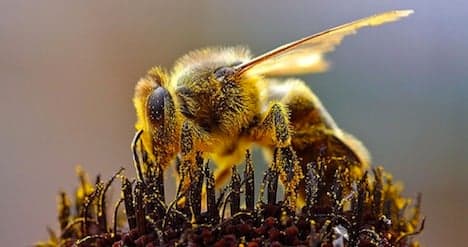Winter bee loss stabilizes in Switzerland: report

One in four bee colonies in Switzerland either failed to survive the winter or were too weak to produce honey, a new report shows.
Although that sounds dramatic, it is around average for a typical year and is lower than the “catastrophic” losses of the 2011-12 year, Agroscope, the federal agricultural research institute, said in a report released on Thursday.
The country’s more than 1,000 beekeepers, aged from 14 to 99, can breathe a sigh of relief, the institute said.
Fifteen percent of the loss occurred from the start of hibernation in October to the emergence from winter in April, the report said.
Added to this was a five percent loss in colonies prior to hibernation and around nine percent of bee populations too feeble to produce honey.
The report, compiled with the aid of the Swiss beekeeping association, comes on the heels of a decision by the federal office of agriculture to suspend the use of three crop pesticides that are fatal to bees starting in December.
These are used in the cultivation of corn and colza.
The decision follows a decision by the European Commission to halt the use of the pesticides, although the commission is seeking further action on pesticides used on sunflowers.
The bans have been opposed by pesticide producers, such as Syngenta, the Basel-based agricultural chemical producer, who argue that there is no evidence to link the pesticides with bee deaths.
The Swiss federal government is also urging parliament to reject the action to suspend the use of the targeted pesticides.
The Agroscope report is unable to completely explain the bee loss but it steers away from any mention of pesticides.
However, it says weather conditions last year were not favorable for the development of bee colonies.
Also, the research centre say a parisitic mite called verroa, introduced into Switzerland 30 years ago, is “undoubtedly” contributing to the reduction in the bee population.
The mite attaches to the body of honey bees and weakens them by sucking their blood.
The Agroscope report says other factors threaten bees, such as the lack of food during certain times of the year, encroachment of buildings in agricultural zones and natural areas, and environmental pollution.
Comments
See Also
Although that sounds dramatic, it is around average for a typical year and is lower than the “catastrophic” losses of the 2011-12 year, Agroscope, the federal agricultural research institute, said in a report released on Thursday.
The country’s more than 1,000 beekeepers, aged from 14 to 99, can breathe a sigh of relief, the institute said.
Fifteen percent of the loss occurred from the start of hibernation in October to the emergence from winter in April, the report said.
Added to this was a five percent loss in colonies prior to hibernation and around nine percent of bee populations too feeble to produce honey.
The report, compiled with the aid of the Swiss beekeeping association, comes on the heels of a decision by the federal office of agriculture to suspend the use of three crop pesticides that are fatal to bees starting in December.
These are used in the cultivation of corn and colza.
The decision follows a decision by the European Commission to halt the use of the pesticides, although the commission is seeking further action on pesticides used on sunflowers.
The bans have been opposed by pesticide producers, such as Syngenta, the Basel-based agricultural chemical producer, who argue that there is no evidence to link the pesticides with bee deaths.
The Swiss federal government is also urging parliament to reject the action to suspend the use of the targeted pesticides.
The Agroscope report is unable to completely explain the bee loss but it steers away from any mention of pesticides.
However, it says weather conditions last year were not favorable for the development of bee colonies.
Also, the research centre say a parisitic mite called verroa, introduced into Switzerland 30 years ago, is “undoubtedly” contributing to the reduction in the bee population.
The mite attaches to the body of honey bees and weakens them by sucking their blood.
The Agroscope report says other factors threaten bees, such as the lack of food during certain times of the year, encroachment of buildings in agricultural zones and natural areas, and environmental pollution.
Join the conversation in our comments section below. Share your own views and experience and if you have a question or suggestion for our journalists then email us at [email protected].
Please keep comments civil, constructive and on topic – and make sure to read our terms of use before getting involved.
Please log in here to leave a comment.